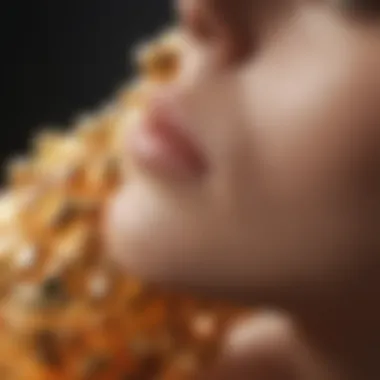Essential Vitamins for Optimal Hair Health


Intro
Hair health is an often overlooked aspect of overall well-being. Many people desire luscious locks, but they may not understand the vital role that vitamins play in achieving this goal. Certain vitamins are crucial for hair growth, strength, and appearance. In this article, we will explore these essential vitamins in detail, discussing their biochemical functions, natural sources, recommended daily intakes, and symptoms of deficiencies that can negatively affect hair health.
By examining current research and expert opinions, this comprehensive guide aims to provide valuable insights for anyone interested in enhancing their hair vitality through nutrition. Whether you are experiencing hair thinning or simply want to ensure your hair remains healthy, understanding the role of vitamins can be a pivotal first step toward improvement.
Overview of Key Vitamins
Understanding which vitamins are essential for hair health is imperative. These vitamins help not only in growth but also protect the hair from damage caused by environmental factors, stress, or hormonal changes. With this knowledge, individuals can make informed choices about their diet and, if necessary, supplementation.
The Significance of Vitamins
Each vitamin plays a unique role in the biochemical processes that promote healthy hair. Deficiencies can lead to various hair issues, including thinning, brittleness, or loss. Thus, ensuring an adequate intake of these vitamins is fundamental in maintaining not only hair health but also overall physical health.
This article will delve into specific vitamins, revealing their impact on hair health and providing practical advice on how to incorporate these nutrients into daily life.
Prologue to Hair Health
Hair health is an important aspect of overall well-being. Well-nourished hair can significantly affect self-esteem and personal presentation. In exploring how vitamins contribute to hair vitality, we must first understand the fundamentals of hair structure and the nutritional needs of the body. Each component plays a role in maintaining hair appearance and strength. Poor hair health can signify underlying issues that may be overlooked.
Understanding Hair Structure
To appreciate how vitamins affect hair, one must first consider the anatomy of hair itself. Hair is primarily made up of a protein called keratin, which forms the structural integrity of each strand. The hair follicle, embedded in the scalp, is where hair grows. It relies on a healthy supply of nutrients to function correctly. Factors such as genetics, hormones, and overall health can influence hair growth and quality. By aiming to maintain a healthy scalp environment, we can support hair growth.
While hair might seem lifeless, the follicle is a living organ that demands care. This care extends beyond topical treatments and involves adequate nutrition, which can aid both the scalp and hair structure.
The Role of Nutrition
Nutritional intake directly impacts hair well-being. Essential vitamins and minerals nourish the hair follicles, encouraging growth and preventing thinning or breakage. A diverse diet rich in vitamins can improve the hair’s texture and appearance.
Specifically, vitamins such as A, B, C, D, and E play crucial roles in processes that sustain hair health:
- Vitamin A promotes cell growth and reproduction. It also helps produce sebum, which keeps the scalp moisturized.
- B vitamins, particularly Biotin, are critical for energy production and the formation of proteins in hair.
- Vitamin C is an antioxidant that protects against oxidative stress.
- Vitamin D can stimulate new hair follicles, fostering hair growth.
- Vitamin E helps protect against damage and promotes blood circulation, which is essential for nutrient delivery to hair roots.
Incorporating a variety of vitamins into your diet is crucial for optimal hair health.
Understanding these aspects provides a foundation for recognizing how to improve hair health through nutrition. A targeted diet can yield substantial benefits and address potential deficiencies that might hinder growth or quality. Proper nutrition, therefore, is not merely an option but a necessity for anyone looking to enhance hair vitality.
Key Vitamins for Hair
The significance of vitamins for hair health cannot be understated. Each vitamin plays a unique role, contributing to overall hair growth, strength, and appearance. Deficiencies in these vitamins can lead to various hair-related issues, which in turn can affect one’s self-esteem and confidence. Therefore, understanding these vitamins is crucial for anyone interested in maintaining or improving their hair vitality.
Additionally, many vitamins have roles that extend beyond hair health. They improve overall bodily function, which indirectly supports hair quality. This relationship emphasizes the importance of incorporating these essential vitamins into one’s daily diet or routine.
Vitamin A
Vitamin A is well-known for its role in maintaining healthy skin and hair. This vitamin helps produce sebum, an oily substance produced by sebaceous glands. Sebum keeps the scalp moisturized and protects against dryness. A healthy scalp can promote better hair growth and reduce the likelihood of hair thinning.
Furthermore, Vitamin A also plays a role in cell growth. This means that it can help produce new cells that contribute to healthy hair follicles. Foods rich in Vitamin A include carrots, sweet potatoes, spinach, and other leafy greens.
Vitamin B Complex
The B-complex vitamins are a group of eight essential nutrients that work together to promote hair health. These vitamins help convert food into energy and facilitate many biochemical processes.
Biotin


Biotin, also called Vitamin B7, is particularly known for its contribution to hair health. It plays a pivotal role in protein metabolism, particularly in keratin, which is a fundamental component of hair.
Biotin is often cited in discussions about hair growth. This is largely due to its ability to support follicle health. A deficiency in biotin can lead to hair loss and brittle strands. Sources of biotin include egg yolks, nuts, and whole grains. Its increasing popularity as a supplement for hair health reflects its perceived benefits.
B6
Vitamin B6 is essential for the proper metabolism of amino acids and the synthesis of neurotransmitters. This vitamin helps in the production of hemoglobin, which carries oxygen to hair follicles. Healthy oxygen supply is vital for hair growth.
Additionally, B6 may help reduce hair loss associated with hormonal imbalances. Foods rich in B6 include bananas, fish, and potatoes. Incorporating these foods into one’s diet can contribute positively to hair vitality.
B12
Vitamin B12 is crucial for the production of red blood cells. These cells transport oxygen throughout the body, including to the hair follicles. Without sufficient B12, hair may suffer from oxygen deprivation, leading to poor growth and even hair loss.
Deficiency in B12 can lead to anemia, which often has a noticeable effect on hair health. Good dietary sources of B12 include animal products such as fish, meat, dairy, and fortified cereals.
Vitamin
Vitamin C is best known for its antioxidant properties. It helps combat oxidative stress, which can adversely affect hair health. By reducing free radicals in the body, Vitamin C aids in maintaining healthy hair.
Also, this vitamin is crucial for collagen synthesis. Collagen provides structure to hair and can enhance its strength. Moreover, Vitamin C assists the absorption of iron from plant-based sources, supporting healthy circulation to hair follicles. Citrus fruits, strawberries, and bell peppers are excellent sources of Vitamin C.
Vitamin
Vitamin D is often associated with bone health, but it also has an important role in hair health. It plays a significant part in the creation of new hair follicles. A deficiency in Vitamin D has been linked to hair loss conditions such as alopecia areata.
The body can synthesize vitamin D through sunlight exposure. Dietary sources include fatty fish, mushrooms, and fortified foods. Ensuring adequate levels of Vitamin D can help in maintaining a healthy scalp and promoting hair growth.
Vitamin E
Vitamin E functions primarily as an antioxidant. It protects hair follicles from oxidative stress and improves blood circulation to the scalp. This increased circulation can promote improved hair growth and health.
Nuts, seeds, and green leafy vegetables are rich in Vitamin E. It can also be applied topically to provide moisture and enhance scalp health. Balancing Vitamin E intake into your routine may yield tangible benefits for hair vitality.
In summary, ensuring adequate intake of these essential vitamins can have considerable benefits for hair health. From supporting growth to preventing loss, each vitamin has a role to play.
Biotin: The Hair Growth Vitamin
Biotin, also known as vitamin B7 or vitamin H, is often termed the "hair growth vitamin." It plays a crucial role in maintaining healthy hair by supporting the processes that produce keratin, a key protein in hair structure. Adequate levels of biotin are essential for promoting hair growth and preventing hair loss. Many people turn to biotin supplements as a remedy for thinning hair or brittle strands, hoping to restore their hair’s vitality.
How Biotin Works
Biotin acts as a coenzyme in the metabolism of carbohydrates, fats, and proteins. Specifically, it helps convert nutrients into energy, which is essential for sustaining various bodily functions, including hair follicle health. When the body has sufficient biotin, it promotes the formation of keratin in hair cells. This results in stronger and healthier hair. Additionally, biotin supports the production of fatty acids, essential for hair shine and resilience.
Sources of Biotin
Biotin can be found in various food sources. Here are some of the top options:
- Egg yolks: Rich in biotin and other vital nutrients.
- Nuts: Almonds, walnuts, and peanuts are great snack choices for biotin intake.
- Seeds: Sunflower seeds are particularly high in this vitamin.
- Legumes: Lentils and beans also provide significant amounts of biotin.
- Whole grains: Foods like oatmeal and barley offer biotin, alongside fiber.
In addition to consuming these foods, many choose supplements to ensure they meet their biotin needs, especially when dietary intake is insufficient.
Deficiency and Symptoms
Biotin deficiency is relatively rare, but it can occur due to certain conditions, such as genetic disorders or prolonged consumption of raw egg whites, which contain avidin that binds to biotin. Symptoms of biotin deficiency may include:


- Hair thinning or hair loss
- Brittle nails that break easily
- Skin rashes, particularly on the face
- Fatigue and general malaise
If you suspect a deficiency, it is recommended to consult a healthcare provider for appropriate testing and guidance.
"Biotin is essential for hair health; lack of it can lead to serious issues."
The Importance of Antioxidants
Antioxidants are crucial for maintaining hair health. They protect hair from oxidative stress, which can lead to premature aging of hair follicles. Oxidative stress occurs when there is an imbalance between free radicals and antioxidants in the body. Free radicals can damage skin and hair cells, making it important to incorporate antioxidants into one’s diet.
- Benefits of Antioxidants for Hair
Antioxidants help to neutralize harmful free radicals. This action not only supports hair growth but also prevents hair loss. Moreover, these compounds can improve the overall quality of hair, making it shinier and stronger. The benefits extend to combating inflammation and supporting blood circulation in the scalp, both of which are vital for healthy hair. - Considerations
While antioxidants are beneficial, it is essential to maintain a balanced intake. Over-reliance on supplements instead of whole foods can lead to an imbalance in nutrition. Whole foods provide additional nutrients that work synergistically to promote hair health.
Free Radicals and Hair Loss
Free radicals are unstable molecules that can harm various cellular structures. In hair follicles, they can disrupt normal function, leading to hair thinning and loss. Sources of free radicals include UV radiation, pollution, and even some dietary choices high in processed sugars.
Hair is particularly vulnerable, as follicles must replicate new cells regularly to maintain growth. Free radical damage can inhibit this process, resulting in slower or halted regrowth.
Vitamins as Antioxidants
Vitamin
Vitamin C is a powerful antioxidant that plays a significant role in hair health. It supports collagen production, which is essential for maintaining the structure of hair strands. Additionally, Vitamin C enhances iron absorption, which is crucial for healthy hair as iron deficiency can lead to hair loss. Many individuals consider Vitamin C a first choice for its multi-faceted benefits in nutrition and health. However, one should note that excessive intake might lead to digestive discomfort.
Vitamin E
Vitamin E is another important antioxidant. It helps to shield the skin and scalp from oxidative damage caused by free radicals. This protection can promote a healthier environment for hair growth. Vitamin E is rich in tocopherols, which not only nourish hair follicles but also improve circulation in the scalp. That is a key characteristic that makes Vitamin E popular among those pursuing hair health. However, it is important to monitor the dosage as too much can cause adverse effects, such as bleeding issues.
In summary, integrating antioxidants such as Vitamin C and Vitamin E into your routine can provide substantial support in preventing hair loss and promoting overall hair quality.
Incorporating a variety of foods rich in these vitamins can significantly enhance your hair's vitality.
Optimal Dosages for Hair Health
Understanding the correct vitamin dosages is key to achieving optimal hair health. Vitamins support various processes in the body, including hair growth and strength. They work at the cellular level, influencing not only the hair itself but also the scalp and overall well-being. Yet, it is not just about getting enough vitamins; it is also critical to find the right balance.
Vitamins can be categorized based on their daily required amounts, referred to as Recommended Daily Allowance (RDA). Overdoing it can lead to diminished returns, where excessive intake may cause side effects rather than benefits.
Recommended Daily Allowance
The Recommended Daily Allowance varies based on specific vitamins. For instance, the RDA for Vitamin A is about 900 micrograms for men and 700 micrograms for women. Meanwhile, for Biotin, a member of the Vitamin B complex, the suggested daily intake is about 30 micrograms for adults. Vitamin C has a recommended intake of 90 milligrams for men and 75 milligrams for women. These amounts depend on several factors including age, sex, and health conditions.
It's important to consume a balanced diet rich in these vitamins to meet these recommendations naturally. Foods like carrots, spinach, eggs, nuts, and citrus fruits can all contribute to fulfilling these vitamin allowances, infusing daily meals with nutritious value.
Excessive Intake and Risks
While vitamins are crucial, excessive intake can lead to adverse effects. Fat-soluble vitamins such as A, D, E, and K accumulate in the body and can become toxic. For example, too much Vitamin A can lead to headaches and toxicity, while excessive Vitamin E might increase bleeding risk.
Water-soluble vitamins, such as C and B-complex, are less risky since they are excreted more readily. However, very high doses of particular B vitamins can cause nerve damage or other health issues. Thus, it’s essential to stick to recommended dosages and consult with health professionals before taking high-dose supplements.
"Optimal dosages are the bridge between deficiency and toxicity. Balance is essential."
Overall, understanding optimal dosages contributes to effective hair health management. Striking the right balance of vitamins not only promotes hair health but also supports overall wellness.
Integrating Vitamins into Diet


A comprehensive approach to enhancing hair health necessitates not just an understanding of which vitamins are beneficial, but also how to effectively incorporate them into daily dietary habits. By focusing on this integration, individuals can create a robust nutritional framework that fosters hair vitality and overall well-being. Vitamins play crucial roles in cellular production, growth, and repair. Hence, ensuring an optimal intake of these nutrients can make a significant difference in hair quality and appearance.
Whole Food Sources
Whole food sources are the most effective way to obtain essential vitamins. Unlike supplements, they provide not only vitamins but also minerals and other nutrients that can synergistically enhance absorption and effectiveness.
Some notable whole food sources include:
- Vitamin A: Carrots, sweet potatoes, and spinach.
- B Vitamins: Whole grains, eggs, fish, and legumes.
- Vitamin C: Citrus fruits, strawberries, and bell peppers.
- Vitamin D: Fatty fish like salmon, fortified milk, and exposure to sunlight.
- Vitamin E: Nuts, seeds, and green leafy vegetables.
By selecting a varied diet rich in these foods, one can easily meet daily vitamin requirements.
Supplementation Considerations
While whole foods are highly recommended, supplementation may be necessary in certain cases where dietary intake might fall short. Factors such as age, dietary restrictions, or health conditions can necessitate extra care regarding vitamin intake. However, it is essential to approach supplementation cautiously.
Considerations for effective supplementation include:
- Consulting with a healthcare professional to assess any deficiencies.
- Choosing reputable brands that offer well-formulated supplements.
- Monitoring dosages to avoid excessive intake, which can be detrimental.
"A well-balanced diet can often meet your vitamin needs without the need for supplements, but if you choose to supplement, do so wisely."
By making these dietary adjustments, individuals will not only support their hair health but also their overall health and vitality.
Lifestyle Factors Affecting Hair Health
Lifestyle choices play a significant role in the overall health of hair. While vitamins are essential for nourishment, they do not operate in isolation. A person’s daily habits, stress levels, and sleep patterns profoundly influence hair vitality. Understanding these elements provides a more holistic view of how to maintain and enhance hair health.
Stress and Its Impact
Stress is a common phenomenon that affects people in various ways, including hair health. When the body experiences stress, it may enter a reactive state, releasing hormones such as cortisol. This surge can lead to hair thinning or loss by disrupting the hair growth cycle. For some, stress-induced hair loss manifests as telogen effluvium, a temporary condition where hair follicles enter a resting phase prematurely.
Managing stress is crucial not just for mental well-being, but also for hair health. Techniques such as meditation, yoga, or regular physical exercise can help mitigate stress levels. For instance, regular physical activity increases blood circulation, ensuring that hair follicles receive necessary nutrients.
"Stress may not only affect your mental health. It can also impact your hair, making stress management vital for maintaining healthy locks."
Sleep and Hair Regrowth
Sleep is another critical factor affecting hair health. Quality sleep allows the body to repair and regenerate. During deep sleep, the body releases growth hormones that can aid hair regeneration. Insufficient sleep can hinder these processes, leading to hair becoming more fragile and less resilient.
Aim for at least seven to eight hours of uninterrupted sleep per night. Establishing a regular sleep schedule and creating a tranquil bedtime routine can improve the quality of sleep. Reducing screen time before bed and ensuring a conducive sleeping environment can also contribute to better rest.
Ending: Nourishing Hair from Within
Nourishing your hair involves not only external care but also significant focus on diet and nutrition. This article has emphasized how essential vitamins play a critical role in promoting hair health. Each vitamin discussed contributes uniquely to hair growth, strength, and overall appearance. Understanding their functions allows individuals to make informed dietary choices that can enhance hair vitality effectively.
Summary of Key Vitamins
Key vitamins crucial for hair health include:
- Vitamin A: Supports sebum production, aiding scalp health.
- Vitamin B Complex: Particularly biotin, promotes hair growth and reduces breakage.
- Vitamin C: Helps absorb iron and promotes collagen production, vital for hair structure.
- Vitamin D: Linked to hair follicle cycling, necessary for new hair growth.
- Vitamin E: Enhances blood circulation to the scalp and combats oxidative stress.
To summarize, each of these vitamins has specific benefits that contribute to healthier hair. Incorporating them into your diet can create a solid foundation for maintaining vibrant and strong hair.
Final Recommendations
For individuals looking to enhance their hair health, consider the following practical steps:
- Adopting a balanced diet rich in whole foods, including fruits, vegetables, nuts, and seeds that provide these vital vitamins.
- Periodically assessing your vitamin intake through dietary logs or consultations with nutritionists.
- Considering supplements only after discussing with healthcare providers, especially if you suspect deficiencies.
- Staying hydrated and managing stress, as these factors play indirect yet crucial roles in hair health.
In essence, nourishing hair from within requires a holistic approach. A strategic mix of the right vitamins and lifestyle adjustments can lead to significant improvements in not just the hair itself, but also overall well-being.



